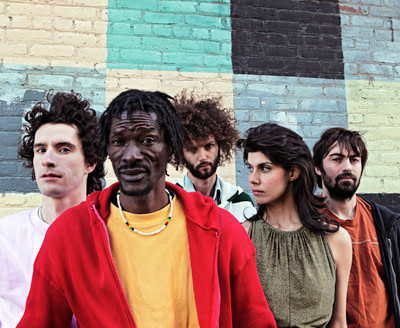Interview: Janka Nabay and the Bubu Gang

Janka Nabay became an unintentional star in his home country of Sierra Leone when he re-popularized an infectious traditional music cloaked in mythology: bubu (Nabay says the story goes that a young “bubu boy” took it from witches 500 years ago and brought it to the public at large, sacrificing his own life in the process). But when he started to sing about the Civil War, the rebels used his songs to sound their battle cry, and finally he was forced to flee the country.
One of the biggest singers from Sierra Leone suddenly found himself working in fried chicken joints and food trucks up and down the East Coast. But then he was discovered by a public radio producer who helped him put together a band, mostly with members of the band Skeletons. Now, with the help of David Byrne’s label, he’s released his first full-length album, En Yay Sah, and transformed Africa’s traditional bubu style music into a beautiful, futuristic electronic dance fusion.
Janka and his Bubu gang will headline the 13 Months of Sunshine: African Sounds Dance Party at Holocene next Wednesday, July 18.
We talked with Janka on the phone about his journey from civil war-wracked Sierra Leone to US music clubs.
What was it like in Sierra Leone during the height of your career?
I remember a particular time between 1996 and 1998. These three years were the most terrible for me during the war. They think when you’re famous you’ve got money. I was so renowned that there was writing on the walls saying that they wanted my head. You know, it’s so brutal, and I was so scared. I was sick, not sleeping, having to watch out for each minute.
You emigrated to the US in 2003. What were the circumstances that prompted your move?
Nothing was around in Sierra Leone: no movement, no cars running… I had no option but to get out of the country. I got help from someone in Maryland and they helped me to come here!
Did you realize that the sound of Western African music was becoming a source for young musicians living in the US?
Yes, I did realize that. All the guys that I’d meet wanted to play songs with me–"Let’s do this! Let’s do this!"—saying they loved my music. Any place we’d go, it’s the same thing. Right now, They want the African beat. People are used to the present beats…they’ve been listening to it for too long. They want the new fresh thing. And I come up with the bubu music and it’s fresh to them, they appreciate it, and then everyone wants to do something with it. Bubu is dancing music, it’s lyrical; bubu is everything. When you hear it, you dance. The message is all about advice. Right now our world is so rough and we need something to remind us about God, family, taking care of children, all those things. That’s what bubu music stands for now.
Do you think your lyrics will remain political now that you’ve been living in the States?
The lyrics have to change. The way we think over there and the way they think here is so different. The music stays the same — musicians speak the same language all over the world. Basically, I was singing political songs about the war. Now that the war is over, we don’t need any more political songs: we need something else. How can we develop? We need to become a developed nation. We need to grab this movement again. Living in America, it’s working, because I’m watching, acting, and doing things to put in my music and my people pick it up. Yeah, living in America with bubu music changes a whole bunch of things!
Do you write lyrics for Boshra Al Saadi (the female vocalist in the group)?
I do everything. The thing about her: she can’t speak the language, has never been to Africa, never been in pyramids. For me to teach her the songs? It’s not in English, it’s in Krio, in Temne. And these guys have never played our instruments, they’ve never been to Africa, but they play it right. It’s so good. The group is ready to do anything.
Do you feel having to work across cultures like this makes you all more creative?
These guys are awesome. I tell them to do something in bubu music, and then they try to do it. At times they don’t even catch the real bubu, but we create like mystics. The thing that you just played? It’s so different, so cool, it’s so…good. So we look for other things and the music is changing all the time.
My favorite song is on the new record is "Feba." Can you tell me what it means?
"Feba" means "look alike". I’m talking about a girl who has a son and the husband thinks the boy doesn’t look like him. A lot of married men doubt their wives when their child doesn’t look like them! [laughs]
Do you ever get homesick?
Not so much before, but I do now because this group is so much stronger. Right now my people love them. I get these phone calls because they’ve seen us online. They already know about the group because they’ve seen us on the Internet. Newspapers in my homeland write something about us everyday.
What’s next for you?
Right now we’re recording a bunch of songs. We just made an awesome song for the London Olympics. We have four days between this tour and the next, so when we’re in New York we shall make two new songs.
Will you perform in London for the ceremonies?
We want to, but we are not waiting for the Olympics to call.
